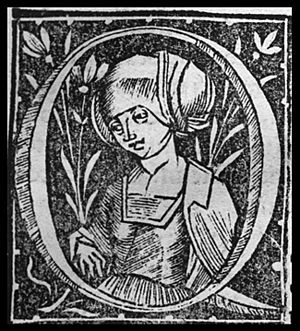Paul of Aegina facts for kids
Paul of Aegina or Paulus Aegineta (Greek: Παῦλος Αἰγινήτης; Aegina, c. 625 – c. 690) was a 7th-century Byzantine Greek physician best known for writing the medical encyclopedia Medical Compendium in Seven Books. He is considered the “Father of Early Medical Writing”. For many years in the Byzantine Empire, his works contained the sum of all Western medical knowledge and was unrivaled in its accuracy and completeness.
Life
Nothing is known about his life, except that he was born in the island of Aegina, and that he travelled a good deal, visiting, among other places, Alexandria. He is sometimes called Iatrosophistes and Periodeutes, a word which probably means a physician who travelled from place to place in the exercise of his profession. The exact time when he lived is not known; but, as he quotes Alexander of Tralles, and is himself quoted by Yahya ibn Sarafyun (Serapion the Elder), it is probable that Abu-al-Faraj is correct in placing him in the latter half of the 7th century.
Works
The Suda says he wrote several medical works, of which the principal one is still extant, with no exact title, but is commonly called Medical Compendium in Seven Books (Greek: Ἐπιτομῆς Ἰατρικῆς βιβλία ἑπτά, Epitomes iatrikes biblia hepta). This work is chiefly a compilation from earlier writers; indeed its Greek title proclaims that it is an epitome of medicine, "epitomes iatrikes."
William Alexander Greenhill wrote that his reputation in the Islamic world seems to have been very great, and it is said that he was especially consulted by midwives, whence he received the name of Al-kawabeli or "the Accoucheur." He is said by the Arabic writers to have written a work, "De Mulierum Morbis," and another, "De Puerulorum Vivendi Ratione atque Curatione." His great work was translated into Arabic by Hunayn ibn Ishaq.
The sixth book on surgery in particular was referenced in Europe and the Arab world throughout the Middle Ages, and is of special interest for surgical history. The whole work in the original Greek was published in Venice in 1528, and another edition appeared in Basel in 1538. Several Latin translations were published. Its first full translation into English, was by Francis Adams in 1834. .....
Honours
In 1753, botanist Carl Linnaeus published Aeginetia, which is a genus of flowering plants belonging to the family Orobanchaceae and native mostly to tropical Asia. It was named in Paul of Aegina's honour.
See also
 In Spanish: Pablo de Egina para niños
In Spanish: Pablo de Egina para niños


